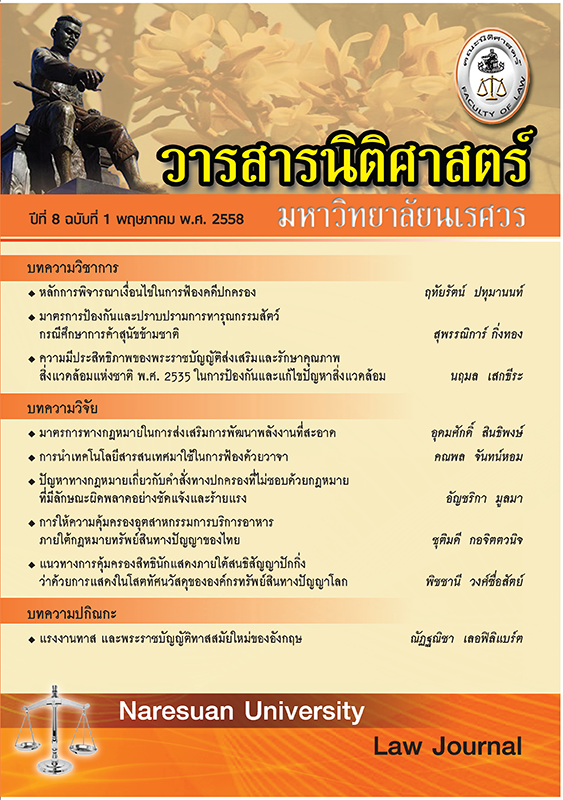The Effectiveness of the Enhancement and Conservation of National Environmental Quality Act B.E.2535for Preventing and Solving Environmental Problems
Main Article Content
Abstract
In 1992 (B.E.2535), Thailand passed the Enhancement and Conservation of National Environmental Quality Act B.E.2535 which is a central law on the protection of environment in Thailand. The law was intended to compile and provide basic environmental rules and principles covering various aspects related to the environment. Thus, it contains provisions concerning policies and action plans, management, promotion, and measures, including the rights and duties of citizens which to be used to protect the environment. The Act contains 115 sections. To date, the law has been in forced for a long period of 22 years. In this article, I will specifically explain the effectiveness of the Act in preventing and solving environmental problems. I will analyze, focusing on the essence of this Act, whether or not the law provides an effective approach in preventing and solving environmental problems. If the answer is not, the next steps would be to find out the reasons for such inefficiency and how to improve it respectively.
Article Details
References
จุไร ทัพวงศ์. “แนวทางการควบคุมมลพิษ : ผู้ก่อให้เกิดภาวะมลพิษเป็นผู้จ่าย.” สิ่งแวดล้อม 35.
นฤมล เสกธีระ. “หลักการกำหนดให้ผู้ก่อมลพิษเป็นผู้จ่ายเพื่อแก้ปัญหามลพิษทางอากาศจากภาคอุตสาหกรรม.” วารสารนิติศาสตร์ มหาวิทยาลัยนเรศวร. 6, ฉ.1 (2555): 175-199. 2555.
นฤมล เสกธีระ. รายงานวิจัยฉบับสมบูรณ์ โครงการ หลักการกำหนดให้ผู้ก่อมลพิษเป็นผู้จ่ายเพื่อแก้ปัญหามลพิษทางอากาศจากภาคอุตสาหกรรม. พิษณุโลก: คณะนิติศาสตร์ มหาวิทยาลัยนเรศวร, 2555.
นฤมล เสกธีระ. เอกสารประกอบการสอน วิชา 230452 กฎหมายอนุรักษ์ทรัพยากรธรรมชาติ สิ่งแวดล้อมและศิลปวัฒนธรรม. พิษณุโลก: คณะนิติศาสตร์ มหาวิทยาลัยนเรศวร, 2555.
ปัญจพร โกศลกิติวงศ์. “ความรับผิดทางแพ่งของผู้ก่อมลพิษในคดีสิ่งแวดล้อม.” วิทยานิพนธ์ นิติศาสตร์มหาบัณฑิตจุฬาลงกรณ์มหาวิทยาลัย, 2541.
สถาบันวิจัยและให้คำปรึกษาแห่งมหาวิทยาลัยธรรมศาสตร์. รายงานฉบับสมบูรณ์ โครงการว่าจ้างที่ปรึกษาเพื่อศึกษา ปรับปรุง ระบบการวิเคราะห์ผลกระทบสิ่งแวดล้อมภายใต้พระราชบัญญัติส่งเสริมและรักษาคุณภาพสิ่งแวดล้อมแห่งชาติ พ.ศ.2535 เสนอต่อสำนักงานนโยบายและแผนทรัพยากรธรรมชาติและสิ่งแวดล้อม กระทรวงทรัพยากรธรรมชาติและสิ่งแวดล้อม. กรุงเทพฯ: สถาบันวิจัยและให้คำปรึกษาแห่งมหาวิทยาลัยธรรมศาสตร์, 2553.
สุนีย์ มัลลิกะมาลย์. ทางเลือกหนึ่งในการเยียวยาผู้เสียหายจากปัญหามลพิษ. ดุลพาห, 1, ฉ.43 (2544): 98-111.
อำนาจ วงศ์บัณฑิต. กฎหมายสิ่งแวดล้อม. พิมพ์ครั้งที่ 2 แก้ไขเพิ่มเติม. กรุงเทพฯ: วิญญูชน.อุดมศักดิ์ สินธิพงษ์. (2554). กฎหมายเกี่ยวกับสิ่งแวดล้อม. กรุงเทพฯ: โรงพิมพ์เดือนตุลา, 2550.
Air Pollution Control Law 1968, Japan.
OECD. Economic Instrument for Environment Protection. Paris: OECD Publication, 1989.
Robin Bidwell. Business and the Environment: A Changing Agenda. Tei Quarterly Environment Journal, 1, no.3 (1995): 31.


